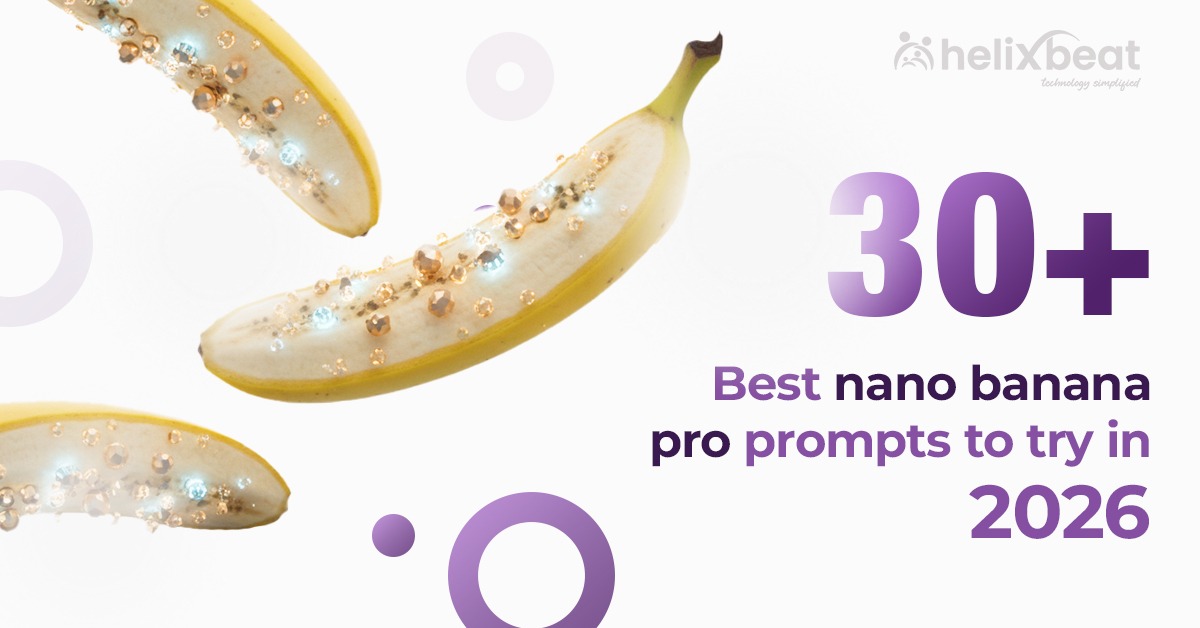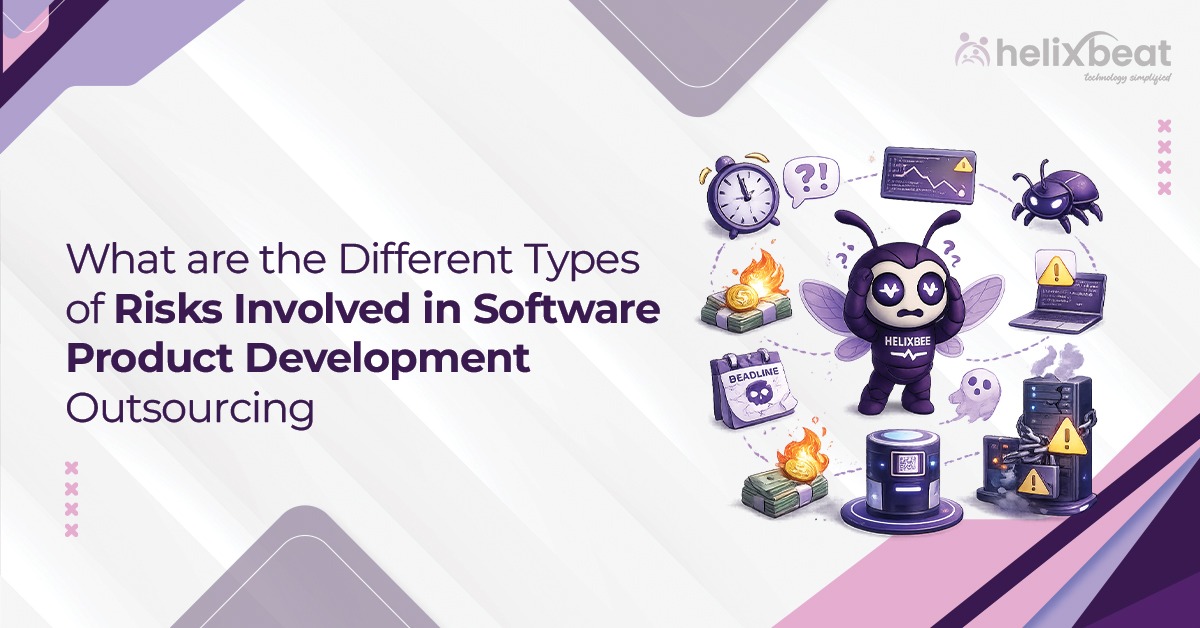Running a healthcare practice is a challenge in itself. From patient care to staff management, the list of responsibilities can seem endless. However, one of the most pressing issues that many healthcare providers struggle with daily is handling payments. It’s a complex web of insurance claims, co-pays, billing errors, and endless paperwork. And amidst all of this, it can be tough to keep up with the ever-growing demands of financial management.
The problem is not just about the cost of care—it’s about the hidden costs of inefficient payment systems. Healthcare providers often find themselves grappling with clunky billing software, slow insurance reimbursements, and lengthy patient payment cycles. This not only causes unnecessary stress but also impacts cash flow, delays reimbursements, and creates a backlog of unpaid bills.
On top of that, many healthcare providers still face high processing fees from traditional payment systems, leaving them with little room to grow or reinvest in their practices. The fees seem small at first, but they add up over time, eating into profits and making it harder to maintain financial stability.
But what if there was a better way? What if you could manage your payments with ease, cut down on administrative headaches, and improve your practice’s financial health—all without sacrificing the quality of care or dealing with hidden costs? This is where PayNova comes in.
PayNova is a top-notch payment gateway exclusively designed for healthcare payment transactions. Compared to other pricing plans, it delivers affordability without compromising innovation and quality. In this blog, we’ll conduct a comparative analysis of PayNova’s pricing plan.
Let’s break out the first pricing model of PayNova
Table of Contents
PayNova’s Pricing Model: A Breakdown of Value and Transparency
Healthcare providers often face complexities when it comes to managing payments. With multiple payment options, varying transaction fees, and an array of hidden charges, it’s easy to get overwhelmed. Fortunately, PayNova offers a transparent and affordable pricing model, designed to streamline payment processes without any hidden costs. Here’s an in-depth look at PayNova’s pricing and how it delivers value to healthcare providers
1. Lower Transaction Fees
When it comes to payment processing, the transaction fees are the primary concern for any business, including healthcare providers. Many payment processors charge significant fees, making it difficult for small practices or providers to manage their expenses.
PayNova vs. Competitors:
- PayNova offers a competitive 2.60% + $0.10 per transaction for credit and debit card payments. This is lower than other major players like PayPal (2.9% + 30¢) and Authorize.Net (2.9% + 30¢), providing more savings for healthcare providers.
- Square charges slightly lower fees at 2.6% + 10¢ per transaction, but PayNova’s consistent rate across all platforms (credit/debit, ACH, and in-person payments) makes it more predictable and affordable in the long run.
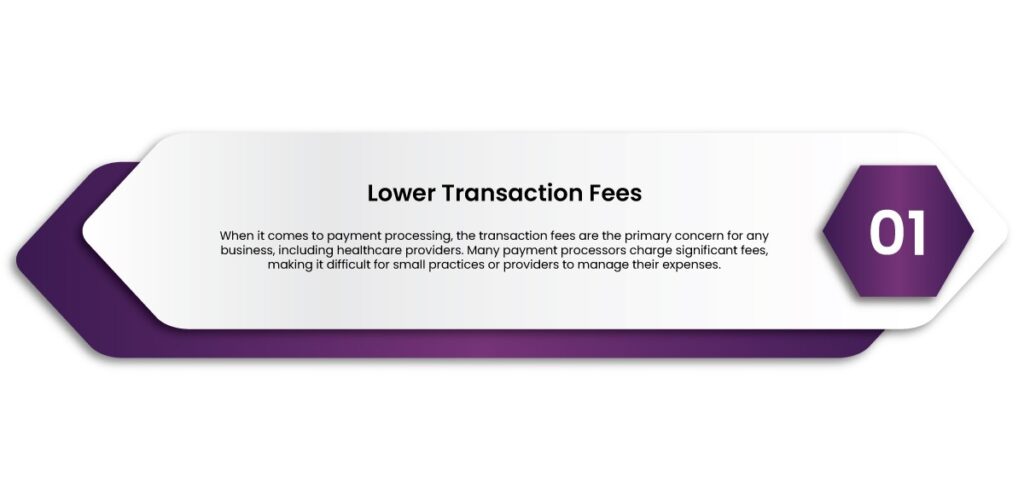
2. Affordable Manual Card Fees
Manually entered cards, often used for over-the-phone payments, tend to carry higher transaction fees due to the increased risk of fraud. While other providers charge steep fees for these transactions, PayNova provides a more cost-effective solution.
PayNova vs. Competitors:
- PayNova charges 3.5% + $0.15 per transaction for manually entered cards, which is quite reasonable compared to PayPal’s 3.49% + 49¢ or Authorize.Net’s 3.5% + 15¢ per transaction.
- Stripe and Square charge similar or higher fees, with Square setting fees at 3.5% + 15¢ per transaction and Stripe at 3.4% + 30¢ per transaction.
By keeping manual payment fees competitive, PayNova helps healthcare providers reduce unnecessary charges, especially for businesses that rely on phone payments or other manual processing.
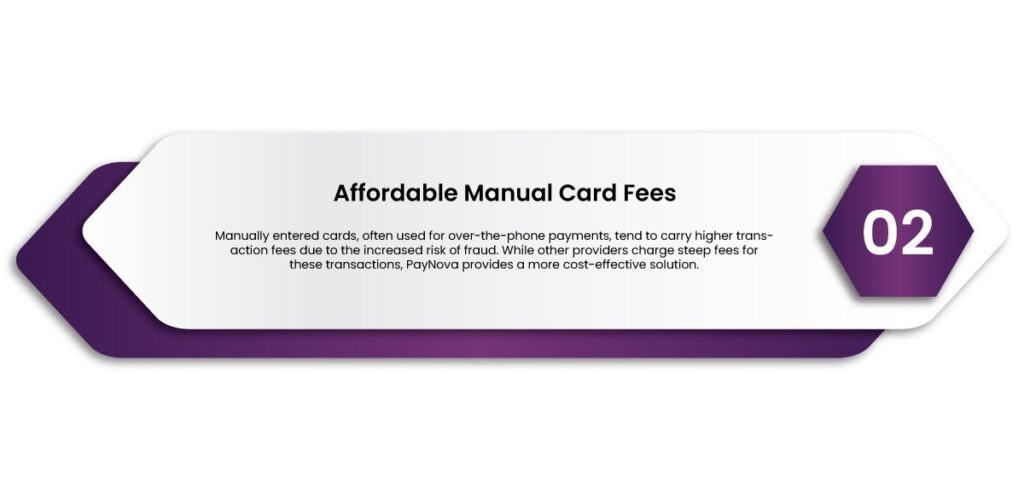
3. Competitive International Payment Rates
For healthcare providers that cater to international patients, dealing with international cards can be a financial burden. International payments often come with hefty extra fees, including currency conversion and foreign transaction costs.
PayNova vs. Competitors:
- PayNova offers 3.95% + 12¢ per transaction for international cards, which is more affordable compared to PayPal’s 4.4% + a fixed fee based on the currency.
- Some other providers, such as Stripe, charge a more standard rate of 2.9% + 30¢ per transaction for international payments, with a small added fee for currency conversion.
While PayNova’s fees may be slightly higher, the platform offers customized pricing based on transaction volume, which could work to the advantage of large-scale healthcare practices or international clinics.
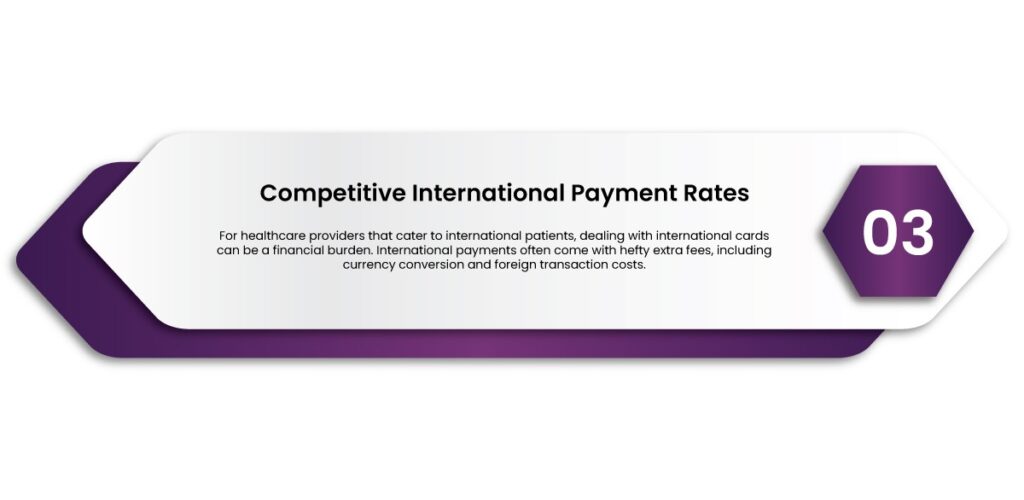
4. ACH and Direct Deposit Fees
ACH (Automated Clearing House) payments are a cost-effective method of transferring funds directly from a patient’s bank account. Many healthcare providers prefer ACH for large sums as it tends to be cheaper than credit card payments.
PayNova vs. Competitors:
- PayNova offers custom pricing for ACH transactions, which is especially beneficial for healthcare organizations that process a large volume of payments through bank transfers.
- Stripe offers ACH at 0.8% capped at $5 per transaction, while Authorize.Net charges $0.75 per transaction.
- Square and PayPal do not support ACH payments at all.
PayNova’s custom pricing for ACH means that providers can negotiate a deal that fits their specific transaction volume, offering them even more control over payment processing costs.
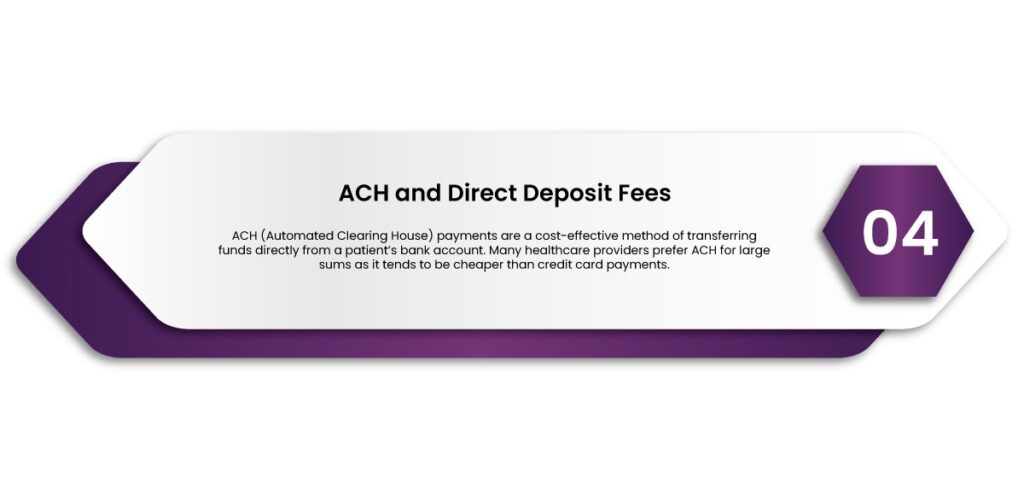
5. In-Person Payments charge is less
While many healthcare providers focus on online transactions, in-person payments are still common in many practices, from copayments at the front desk to payments at pharmacy counters.
PayNova vs. Competitors:
- PayNova charges 2.60% + $0.10 per transaction for in-person payments, making it comparable to other competitors like Square (2.6% + 10¢) and Stripe (2.7% per transaction).
- PayPal charges the same 2.7%, but PayNova’s consistent pricing across all payment types ensures predictability and no surprise fees.
This transparent fee structure ensures that healthcare providers don’t have to worry about fluctuating fees or hidden costs when handling in-person payments.
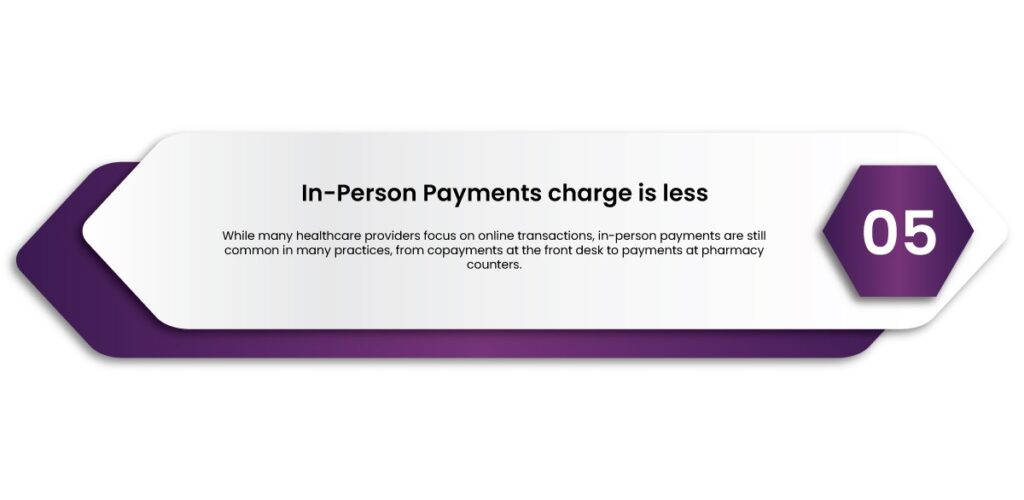
6. No Extra Hidden Costs: Currency Conversion Fees
Currency conversion fees are another hidden cost that can surprise international providers or those working with patients from diverse regions. These fees can add up quickly, cutting into profit margins.
PayNova vs. Competitors:
- PayNova offers custom pricing for currency conversion, unlike PayPal, which tacks on an extra 3-4% on top of the transaction fee.
- Stripe charges 1% on top of the transaction fee, while Adyen adds 1.5% + exchange rate fee.
For healthcare providers with international patients, PayNova’s flexible, custom pricing can help mitigate high fees, offering more control over the total cost of each transaction.
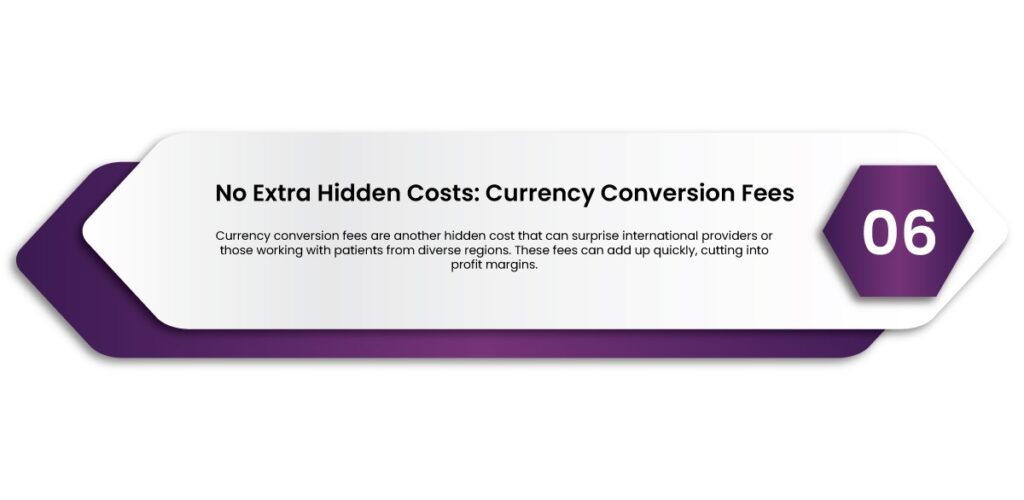
7. Hardware and Terminal Pricing
Healthcare providers that operate in-person often require card readers or terminals for payment processing. The cost of acquiring and maintaining these devices is a crucial factor in choosing the right payment provider.
PayNova vs. Competitors:
- PayNova offers custom hardware pricing, with options for different types of terminals, including Verifone and Magtek, ranging from $150 to $349 depending on the model.
- In comparison, Square charges $299 for a terminal, while Stripe and PayPal offer varying hardware prices with some devices costing as much as $59 or higher.
PayNova’s flexible and custom pricing for hardware ensures that healthcare providers can find a solution that works within their budget and operational needs, whether they need basic card readers or high-end countertop terminals.
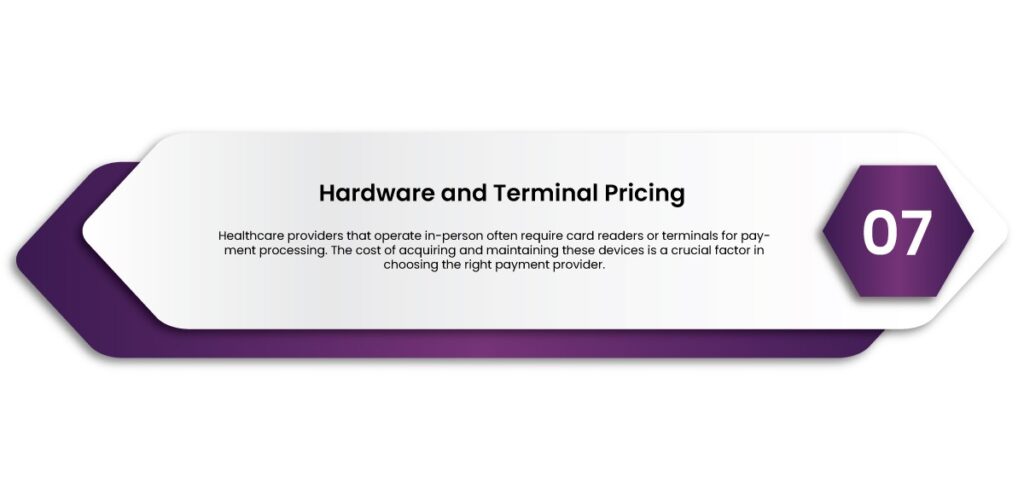
8. Chargeback Fees
Chargebacks are a common challenge for any business accepting payments, including healthcare providers. When a patient disputes a payment, chargeback fees can be expensive, and managing them efficiently is crucial for maintaining a stable cash flow.
PayNova vs. Competitors:
- PayNova charges a $10 per occurrence fee for chargebacks, which is lower than PayPal’s $20 or Authorize.Net’s $25.
- Square and Stripe have similar chargeback fees at $15 and $25 respectively.
By offering a lower chargeback fee, PayNova helps healthcare providers avoid excessive costs when resolving disputes, ultimately improving their financial stability.
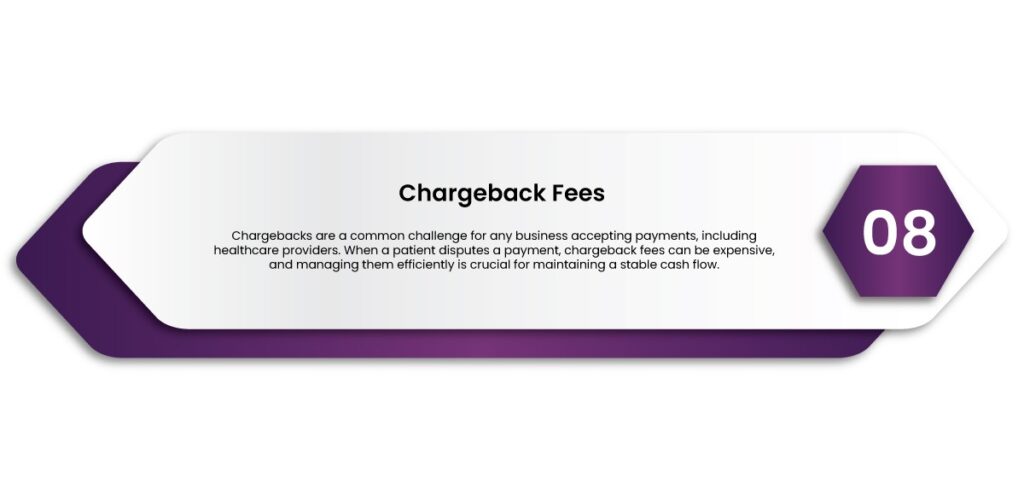
9. Simplified Reporting and Analytics
Transparency in payment processing isn’t just about clear pricing—it’s also about having access to detailed, easy-to-understand reports and analytics. Understanding payment trends and patient behavior can help healthcare providers manage their cash flow better.
PayNova vs. Competitors:
- PayNova provides real-time payment tracking, allowing healthcare providers to instantly track and manage payments with advanced reporting and analytics.
- Square, Stripe, and PayPal all offer reporting tools, but PayNova’s focus on healthcare-specific payment needs allows for more tailored insights, helping providers optimize their operations.
The ability to access detailed payment reports empowers healthcare providers to make better financial decisions, enhance billing accuracy, and reduce administrative overhead.
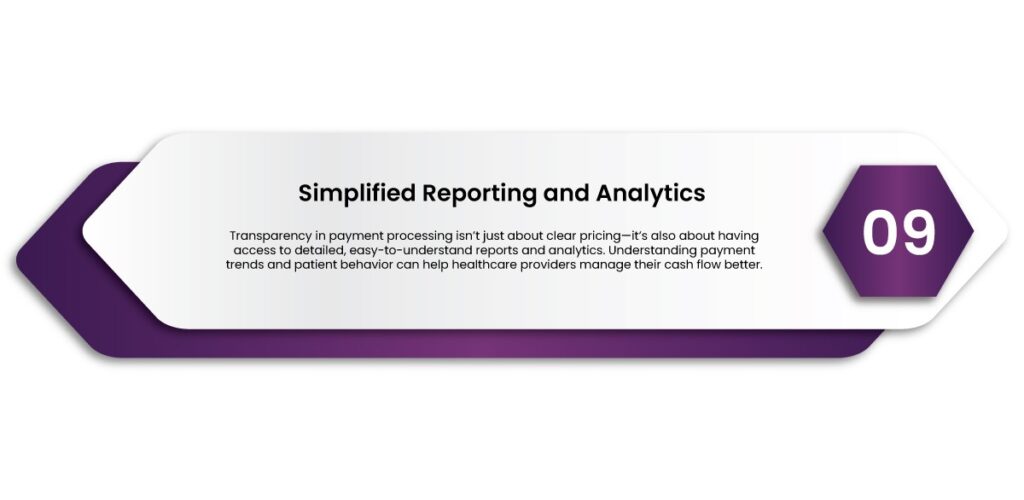
10. Industry-Leading Compliance & Security
The healthcare industry is governed by strict regulations surrounding data protection, including HIPAA and PCI-DSS standards. Payment processors that fail to comply with these regulations expose healthcare providers to significant risk.
PayNova vs. Competitors:
- PayNova is fully compliant with HIPAA and PCI-DSS, ensuring the highest standards of data protection and privacy for patient payments.
- Other competitors, such as Stripe and PayPal, also comply with these standards but may not have the same level of healthcare-specific solutions tailored to providers’ unique needs.
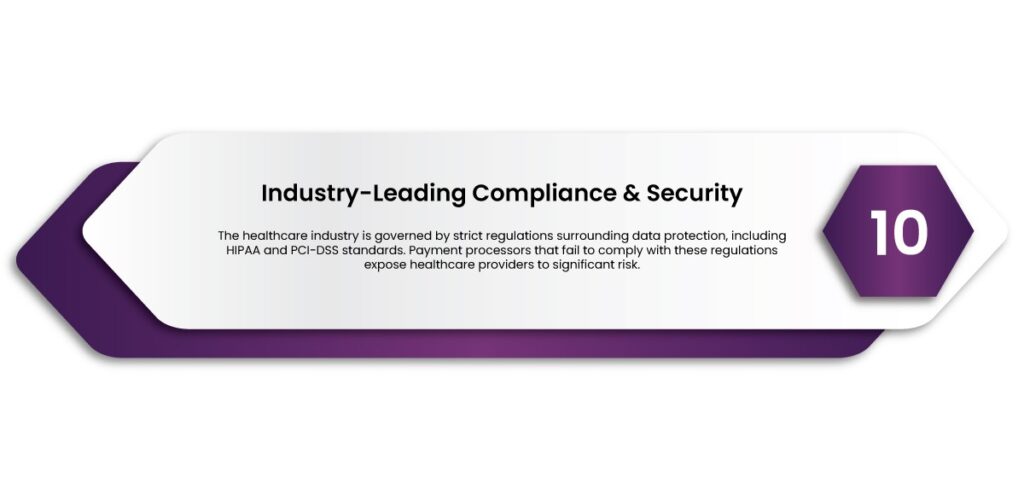
For example:-
Let’s imagine a hospital, “Healing Hands Hospital,” that processes 1,000 credit card transactions per month, each valued at $200.
With PayNova:
Credit Card Fee: 2.60% + $0.10 per transaction
Fee per transaction: 2.60% of $200 + $0.10 = $5.20 + $0.10 = $5.30
Total monthly fee: 1,000 transactions × $5.30 = $5,300
Total yearly fee: $5,300 × 12 = $63,600
With competitor:
Credit Card Fee: 2.9% + $0.30 per transaction
Fee per transaction: 2.9% of $200 + $0.30 = $5.80 + $0.30 = $6.10
Total monthly fee: 1,000 transactions × $6.10 = $6,100
Total yearly fee: $6,100 × 12 = $73,200
Savings with PayNova:
Difference in monthly fees: $6,100 (PayPal) – $5,300 (PayNova) = $800
Total yearly savings: $73,200 (PayPal) – $63,600 (PayNova) = $9,600
How Healing Hands Hospital Benefits:
By using PayNova’s payment gateway, Healing Hands Hospital can save $800 each month and $9,600 annually in transaction fees alone. This significant cost reduction allows the hospital to allocate funds toward other important areas such as patient care, technology upgrades, or staff training. By choosing PayNova, the hospital enhances its financial efficiency while maintaining high-quality payment services for patients.
End notes,
After summarizing all the advantages with other competitors you can understand why you should opt for PayNova. It stands out in the crowd as a solution to provide affordability. Not merely within budget, it offers quality and security in payment transactions when your hospitals ensure payment without hidden costs, bringing more profits to your place.
With its transparent pricing, seamless integration, and innovative features, PayNova is changing the game for healthcare payment systems.If you’re tired of dealing with complex payment processes, hidden fees, and delayed reimbursements, PayNova is here to help you streamline your financial operations and improve your practice’s cash flow. Get started with PayNova today and discover a better way to handle healthcare payments—efficiently, securely, and affordably.
Frequently Asked Question:
- What makes PayNova different from other payment processors?
PayNova offers transparent and competitive pricing with no hidden fees, tailored specifically for healthcare providers. With features like lower transaction fees, affordable manual card fees, and specialized solutions for ACH payments, PayNova stands out by addressing the unique needs of healthcare payment systems.
- How much does PayNova charge for credit card payments?
PayNova charges 2.60% + $0.10 per transaction for credit and debit card payments, which is lower than many competitors like PayPal and Authorize.Net.
- What are the fees for manual card payments (over-the-phone)?
PayNova charges 3.5% + $0.15 per transaction for manually entered cards, making it more affordable compared to other providers like PayPal and Authorize.Net.
- How does PayNova handle international payments?
PayNova charges 3.95% + $0.12 per transaction for international card payments. While some competitors charge higher fees or offer more complex pricing structures, PayNova provides a more straightforward and cost-effective solution for international transactions.
- Are there any hidden fees with PayNova?
No, PayNova is committed to transparency. There are no hidden fees for transactions, currency conversion, or other services. The pricing structure is clear, with custom pricing options for ACH payments and other services.
- What are the fees for ACH payments?
PayNova offers custom pricing for ACH payments, which is beneficial for healthcare providers with high transaction volumes. For comparison, Stripe charges 0.8% capped at $5 per transaction, while PayNova’s custom pricing can be adjusted to fit specific needs.
- How does PayNova compare to other payment processors in terms of chargeback fees?
PayNova charges a $10 fee per chargeback, which is lower than competitors like PayPal ($20) and Authorize.Net ($25). This helps reduce unnecessary expenses when resolving disputes.
- Is PayNova compliant with healthcare industry regulations?
Yes, PayNova is fully compliant with HIPAA and PCI-DSS standards, ensuring the highest levels of security and data protection for patient payments.
- What kind of hardware and terminals does PayNova offer?
PayNova provides a range of custom hardware options, including Verifone and Magtek terminals, with prices ranging from $150 to $349 depending on the model. This flexible pricing ensures that healthcare providers can choose the solution that best fits their needs.
- Can PayNova help reduce processing costs for large healthcare practices?
Yes, PayNova’s custom pricing options for large-scale healthcare providers and international clinics allow for significant cost savings based on transaction volumes.
- Is PayNova available for practices of all sizes?
Yes, PayNova caters to healthcare providers of all sizes, from small clinics to large healthcare systems. Its customizable pricing and flexible solutions make it suitable for practices with varying needs and transaction volumes.








